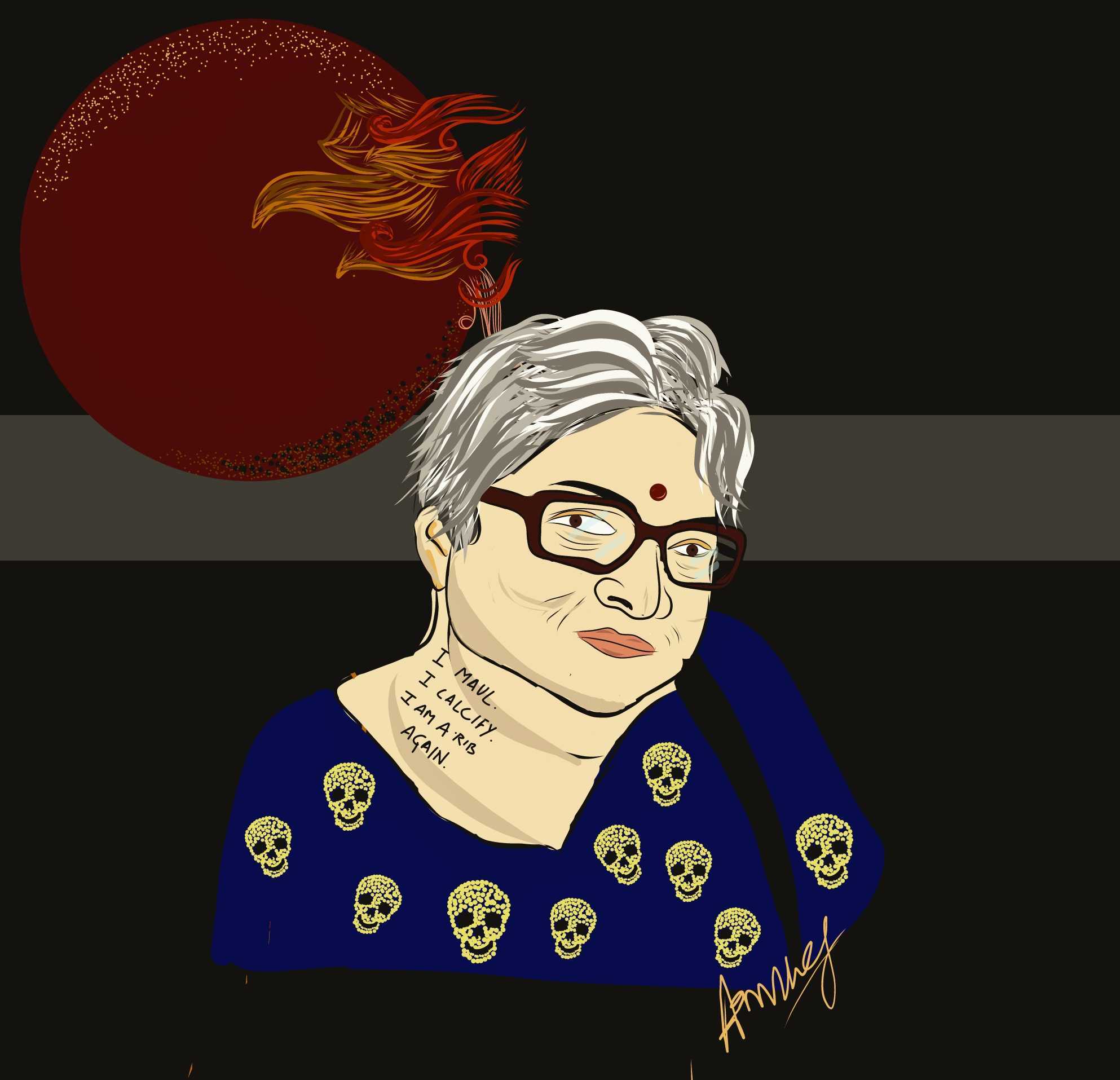A Necklace of Skulls is a short anthology of poems written by Eunice De Souza over a period of three decades at different points in her life. Eunice de Souza was an Indian English language poet, literary critic and novelist. Among her notable books of poetry is Women in Dutch painting (1988). Her writing includes deep rooted intergenerational traumas passed on to women, self-reflective content and aspects of critique towards the Goan Catholic community.
The book contains witty, sharp and unapologetic poems, seventy-five of them, divided under seven sub-sections. The collection includes poems from her previously unpublished as well as published and well read works such as Fix (1979) and Dangerlok (2001). Eunice De Souza remembers a certain Canadian academic who once told her that her poems weren’t poems because they lacked images. She played her lack of imagery to her strength and wrote succinct poems which worked on the principles of immediacy and urgency.
In the preface of the book De Souza writes, ”The creative process being what it is, I don’t really know where poems came from. But I am endlessly grateful that they turned up.” Her poems have her prosaic presence and her presence demands to be acknowledged by the reader. Eunice De Souza writes so intricately about the unspoken circles of understanding which women stand within, together. Her writing is revolting; it makes you gasp and reminds you of Kamala Das’s instantaneous irony and mockery of expected social standards. De Souza constructs a name for the unnamed feeling of being drawn into the women’s circle of sympathy. Her poems, although stoic, barge into the minds of women and see what it looks like to watch from there.
Her poems have her prosaic presence and her presence demands to be acknowledged by the reader. Eunice De Souza writes so intricately about the unspoken circles of understanding which women stand within, together. Her writing is revolting; it makes you gasp and reminds you of Kamala Das’s instantaneous irony and mockery of expected social standards. De Souza constructs a name for the unnamed feeling of being drawn into the women’s circle of sympathy. Her poems, although stoic, barge into the minds of women and see what it looks like to watch from there.
About The Poems
The anthology brings together poems with subjects which span across her own firsthand experiences—from being a teacher in ‘My Students’ to the comparison of her grandmother’s life to that of a servant who shares the silence under circumstances of benevolent and accepted oppression in ‘My Grandmother’. Pieces such as “Marriages are made” and “Mrs Hermione Gonsalvez” mock social beliefs which reside and continue to live on inside us. The collection of her poems stands with great women writers in history, always at a distant pace and varies in its own light of clever-worded, funny and gripping narratives which find a stained reflection of the late William Blake under themes of survival and innocence in Selected and New Poems (1994).
Eunice De Souza uses plain yet explanatory nuances such as the misunderstanding of the ‘Shivalinga’ as an ashtray by a person from a foreign culture. In the name of the book itself, ‘death’ is made a clear trope and it continues to haunt her writing in works like ‘My Grandfathers Death’ and other poems in which she talks about the absence of her own father as a void for her to fill- more as forced responsibility rather than personal ambition.
Her poetry narrates pieces of her life that give meaning to existence and to give life to incidents that would’ve been passed as humorous data of everyday living. The light of curiosity is drawn towards human relationships, the politics of intimacy which pushes conflict and pivotal female figures in the life of the poet who have been shackled as well as the ones who broke moral code for a more peaceful and fulfilling living.
Also read: In A Different Voice: Poetry From The Margins Of The Society
Readability and Parallels
The book reads like a sip of piping hot and bitter tea-bag tea which brings about a riot in your mind and makes you laugh before making you think. Eunice De Souza speaks through the masquerade of an inveterate narrator, watching closely into the lives and contradictions of who people think they are and who they really are. Each line is a call for critical revolt against our own minds. She deconstructs and reflects on the issue of controlled protocol of religious morality and the internalized prejudice of a learning mind as being at a fair distance from the subjective experiences of human minds which leap around dimensions uncommon to the common mind.
Her poetry narrates pieces of her life that give meaning to existence and to give life to incidents that would’ve been passed as humorous data of everyday living. The light of curiosity is drawn towards human relationships, the politics of intimacy which pushes conflict and pivotal female figures in the life of the poet who have been shackled as well as the ones who broke moral code for a more peaceful and fulfilling living.
The book reminds me of a few Bollywood movies—there are shreds of parallel moments in ‘The Lunchbox’ where the women in the film are seen in domestic spaces as well as the outer world but even when a woman leaves the certified domestic space which is constructed for her, she never can let go of the ghost of expectations which live in other people. Poems like ‘General Ward’ and “Aunt” arouse complimenting scenes in “The Lunchbox” where after the death of her husband, the female leads mother blatantly gets rid of her responsibilities and says that all she can feel after all these years of serving for her husband was hungry for food. The virality of responsibility soon dies, but it’s viability never does. The abandonment of discomfort after losing male figures is a trope seen in both narratives.
Also read: Eunice De Souza: The Woman Who Dominated The Poetry Skyline | #IndianWomenInHistory
Her poems have remained solid and autobiographical. They leave imprints, sounds and voices of nameless characters who are hidden, tucked and sandwiched between the lines of her poems. She passed away in 2017 and her poems still read brilliantly and timelessly like words suspended on multiple dimensions of a zeitgeist which is speedily approaching—flagrant, unconcealed and in the uniform of a response to the social scenario still being constructed.
About the author(s)
Aamna is an impulsive writer who is studying and falling in love with English literature. She is learning, unlearning and relearning herself and the world around her every single day. She loves painting and believes that she is the daughter of post modernism.




